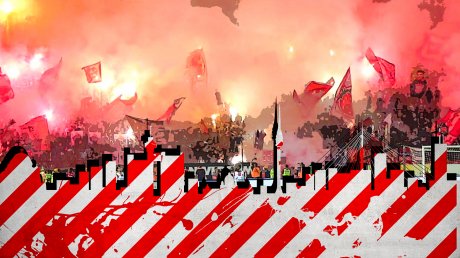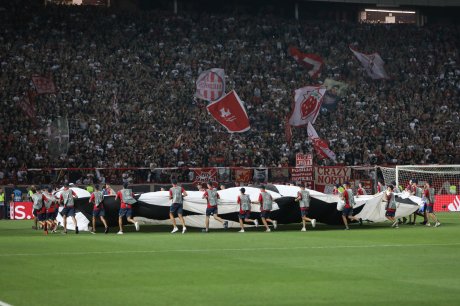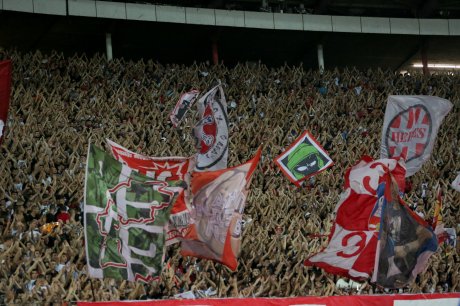Fan tourism - how successes of Serbian football clubs will economically benefit everyone
The draw could not have gone better - at least when it comes to the revenues that will be generated from fan tourism, the director of the Tourist Organization of Belgrade (TOB) has told our portal. Another thing in our favor is the fact that Serbian football clubs have been drawn with those whose fans are traditionally loyal and follow them to all matches: Bayern, Olympiacos and Tottenham (Red Star's group in the Champions League), and Manchester United, Astana and Alkmaar (Partizan's group in Europa League)

Red Star and Partizan progressing to group stages of important European football competitions means much more than simply the competition on the pitch. In addition to the serious sums of money that clubs themselves will earn, we will also benefit from the so-called "fan tourism."
"Sports events are generally big generators of money, but also a promotion for the city," Business Director of the Belgrade Tourist Organization Miodrag Popovic told Telegraf.
He explains that according to UEFA regulations, visiting fans are entitled to five percent of a stadium's capacity - in the case of Red Star, that's 2,500 tickets.
"It's not just the visiting clubs' fans, but also people who come to watch big matches as such, because the clubs we have been drawn with are those whose fans faithfully follow them, so we have a guaranteed 7,500 guests for two nights, that's already 15,000 overnight stays," he told us.
In addition to that number, some ten thousand other Red Star fans will be coming to Belgrade, which affects spending and overnight stays, and these are the fans who live in other parts of Serbia, throughout the region, or in some more distant destinations.
According to Popovic, since this is the second time Red Star will be playing in Europe's most elite football competition, the Champions League, it is becoming an increasingly popular European club, which in turn increases the interest of those people who watch "big" matches across Europe, regardless of who the participants are - and this is a trend that has been developing, particularly in recent years.
And this is not all when it comes to the benefits:

"All this brings very significant revenues for the city both financially, and promotionally. Live broadcasts of the matches themselves again provides a special ambiance, and Red Star's fans were last year voted as the best... they create (stadium) choreography, which is a spectacle to watch. This is not decidedly tourism - but that advertising space becomes extremely expensive," said Popovic.
"This means that the club charges all that a lot, and gives back to Belgrade and Serbia by paying taxes, and this especially applies to the sale of players. That income, which is earned when the money is deposited to the account, goes to Serbia, which is more than a million euros a year," he added.
The fact is, Popovic recalled, that Red Star is thus far certain to rake in 20 million euros - 20 percent of which goes to the state.
As an example of the importance of sports, he mentioned Spain, where football is in the second place as an industry in terms of revenues.
"Unfortunately, Partizan will not play three games but two, we'll see how the draw how will go, who we'll get and whether these clubs will bring fans and tourists," Popovic said, speaking ahead of the draw.
Asked if the fans bring with them certain challenges and potential problems, Popovic said that this is a challenge for everyone, but most of all for the Ministry of Internal Affairs, which, in his opinion, "does a fantastic job when it comes to the safety of fans inside and outside the stadium."
He recalled that during the basketball Final Four played in Belgrade, Red Star fans, Delije, handed out flyers pleading with their fellow supporters not to clash with the visitors. There was also the match against Cologne when their fans stayed for two days, going out, spending time as "ordinary tourists."
"They were wonderful guests, and we were real hosts, I have no doubt that this will also be the case this time around both when it comes to Red Star and Partizan," Popovic told us.
WHAT CAN RED STAR DO WITH ITS MILLIONS?

The mountain of millions that is arriving at Red Star can be used for many purposes, and in addition to the club's fuller coffers, its brand value is also increased.
Apart from earning additional and important points for the club and the Serbian football in general, qualifying for the Champions League also means a good financial injection for the Serbian champion. In addition, the brand of the club itself becomes more valuable, so that could bring in more than ten million euros from sponsorship deals alone. High profits from ticket sales should also be counted in.
And that's not all. The club could translate the money it has earned into investments, first of all into the stadium and the pitch. Thus, a part of the money could be invested by the club in the stadium so that it becomes more suitable for commercial use with competitive leasing prices.
In addition, a chance for a long-term benefit has been created:
"It's certain that it will affect the value of the brand, and this will significantly increase Red Star's revenues. What the long-term effects will be depends on what they do with the money. Will they invest in buying new players so that competing in the Champions League becomes a regular thing - or will the stadium be renovated in some way? Red Star now has a real chance to strengthen the team in the long run and to go through to the spring part of the competition and make more money," Milojko Arsic, an economist and a professor at the Faculty of Economics in Belgrade, told Telegraf Biznis.
As he said, the club now has a chance to "build a strong team that could sometimes progress to the spring part of the League as well," which he thinks should be utilized.
The market is also to Red Star's advantage - if the club launches its privatization process, it's clear that it will be able to ask for a higher price.
"Privatization depends on what form it would take and who would become the new owner. Privatizations are generally good, but not all. Therefore, whether that owner would be looking at the long term, to build a strong European team, or maybe to spend these players that Red Star now has, but also its assets and current resources. It's very important that new owners come here who have an ambition to become one of the top 20 teams in Europe," Arsic pointed out.
"So that there's not only what Red Star is earning with its successes, but for example that they invest additional funds, so that several national team players, or players from other countries' national teams could play for Red Star," he said.
According to Arsic, the money should be used to strengthen the team, retain talent, offer longer-term contracts so that higher revenue can be generated later. He recommends that, from an economic point of view, it would be best to start investing in new grounds and the stadium as soon as possible.
(Vesna Bjelic)
Telegraf.rs zadržava sva prava nad sadržajem. Za preuzimanje sadržaja pogledajte uputstva na stranici Uslovi korišćenja.




